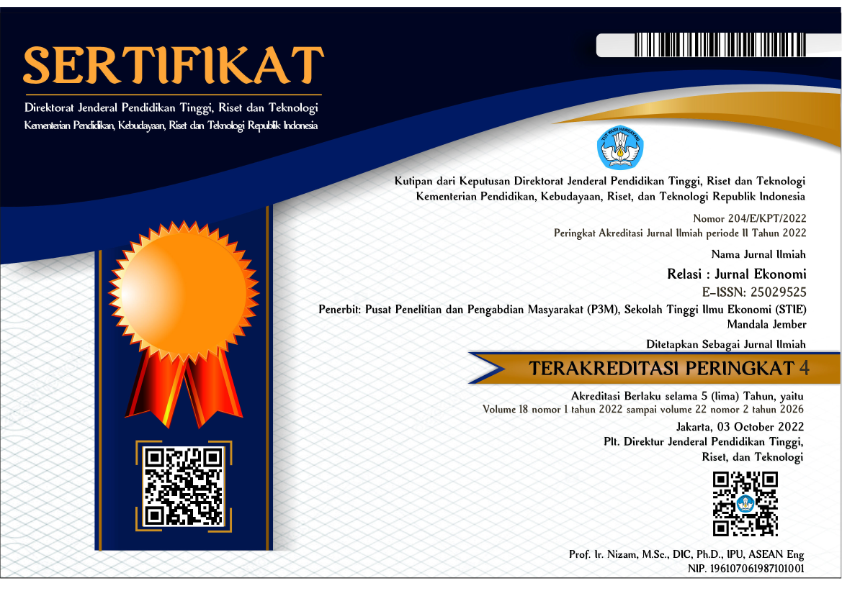Eksplorasi Peran Kompensasi dan Kinerja Karyawan pada Retail Berbasis Komunitas
Abstract
The main argument in this paper is that the relationship between compensation and performance should be recognized as reciprocal, in which, commonly, compensation received by employees will impact their performance. However, there is another logic that emerges whereby employees’ performance becomes an important basis for an organization to settle their compensation. Thus, this current research aims to re-explore the relationship between compensation and performance. Conducting qualitative approach, specifically grounded theory method, this research takes community-based retail as its research object. Data was gathered through semi-formal interview procedure to six organization members, namely owner and employees. Those two groups of informants were interviewed to validate the data through source triangulation. Data was analyzed using Miles and Hubermann procedures and displayed utilizing Gioia template. Based on the analysis, it is confirmed that compensation and performance relationship is reciprocal. The compensation itself consists of financial and non-financial, whereas employee can be measured using three parameters which are employees’ ability, responsibility, and discipline.
References
Adams, J. S. (1963). Towards An Understanding of Inequity. Journal of Abnormal and Social Psychology, 67(5), 422–436. https://doi.org/10.1037/h0040968
Ananto, G. A. N. (2022). Pengaruh Kedisiplinan, Kompensasi, dan Motivasi terhadap Produktivitas Kerja Karyawan PT Semesta Mitra Sejahtera Madiun [Universitas Muhammadiyah Ponorogo]. https://eprints.umpo.ac.id/8632/11/SKRIPSI FULL.pdf
Anderson, E. H., & Barnard, C. I. (1939). The Functions of the Executive. In Southern Economic Journal (Vol. 6, Issue 2, p. 249). https://doi.org/10.2307/1053257
Anonymous. (2025). Ayo Jadi Lebih Baik Bersama SRC. SRC. https://www.src.id/
Editor. (2025). SRC Indonesia Sembilan Ekosistem “AYO” Ciptakan Pengalaman Belanja yang Menyenangkan. SWA. https://swa.co.id/read/457801/src-indonesia-sembilan-ekosistem-ayo-ciptakan-pengalaman-belanja-yang-menyenangkan
Fitri. (2022). Manajemen Kompensasi dalam Meningkatkan Kinerja Karyawan di PT PLN Bakaru Parepare [Institut Agama Islam Negeri Parepare]. https://repository.iainpare.ac.id/id/eprint/3349/1/17.2900.016.pdf
Fulmer, I. S., Gerhart, B., & Kim, J. H. (2023). Compensation and Performance: A Review and Recommendations for The Future. Personnel Psychology, 76(2), 687–718. https://doi.org/10.1111/peps.12583
Fulmer, I. S., Gerhart, B., & Scott, K. S. (2003). Are The 100 Best Better? An Empirical Investigation of The Relationship Between Being A “Great Place to Work” and Firm Performance. Personnel Psychology, 56(4), 965–993. https://doi.org/10.1111/j.1744-6570.2003.tb00246.x
Fulmer, I. S., & Li, J. (2022). Compensation, Benefits, and Total Rewards: A Bird’s-Eye (Re)View. Annual Review of Organizational Psychology and Organizational Behavior, 9, 147–169. https://doi.org/https://doi.org/10.1146/annurev-orgpsych-012420-055903
Gerhart, B. (2023). Compensation (14th ed.). McGraw-Hill, Inc.
Gerhart, B., & Milkovich, G. T. (1992). Employee Compensation: Reserach and Practice. In M. D. Dunnette & L. M. Hough (Eds.), Handbook of industrial & organizational psychology (2nd ed., pp. 481–569). Consulting Psychologists Press, Inc.
Gioia, D. A., & Thomas, J. B. (1996). Identity, Image, and Issue Interpretation: Sensemaking During Strategic Change in Academia. Administrative Science Quarterly, 41(3), 370–403. https://doi.org/10.2307/2393936
Hermawan, K. (2018). Hubungan Kompensasi dan Kinerja Karyawan PT Unipure Indonesia. Universitas Pakuan Bogor.
Kurniawati, E., & Setiawan, A. (2019). The Role of Indonesian Micro, Small, and Medium Enterprises Owners in Choosing e-Commerce Strategy in the Global Market. 1st International Conference on Social Knowledge Sciences and Education, 320, 191–194. https://doi.org/10.2991/icskse-18.2019.37
Langley, A., & Abdallah, C. (2011). Templates and Turns in Qualitative Studies of Strategy and Management. Research Methodology in Strategy and Management, 6(June 2011), 201–235. https://doi.org/10.1108/S1479-8387(2011)0000006007
Lawler, E. L. (1971). Pay and Organizational Effectiveness: A Psychological View. McGraw-Hill, Inc.
Leana, C. R., & Meuris, J. (2015). Living to Work and Working to Live : Income as a Driver of Organizational Behavior. Academy of Management Annals, 6520(July 2016), 55–95.
Mangkunegara, A. P. (2017). Manajemen Sumber Daya Manusia Perusahaan. Remaja Rosdakarya.
March, J. G., & Simon, H. A. (1958). Organizations. Wiley.
Miles, M. B., Huberman, A. M., & Saldaña, J. (2014). Qualitative Data Analysis: A Methods Sourcebook (H. Salmon (ed.); 3rd ed.). SAGE Publications, Inc.
Rousseau, D. M. (1989). Psychological and Implied Contracts in Organizations. Employee Responsibilities and Rights Journal, 2(2), 121–139. https://doi.org/10.1007/BF01384942
Rousseau, D. M., & Ho, V. T. (2000). Psychological Contract Issues in Compensation. In S. L. Rynes & B. Gerhart (Eds.), Compensation in Organizations: Current Research and Practice (pp. 273–310). Jossey-Bass.
Syahrir, Nasruddin, Azis, M., Waruwu, K., Umanailo, M. C. B., Safitri, I. L. K., & Yusriadi, Y. (2021). Effect of compensation and competence on employee performance through employee development. Proceedings of the International Conference on Industrial Engineering and Operations Management, 3178–3185. https://doi.org/10.46254/sa02.20210870
Tirta, A., & Sarli, P. W. (2021). Indonesia’s SME Hold Economy to Growth. How Can They Scale Up? https://www.weforum.org/agenda/2021/09/how-can-indonesian-smes-scale-up/
Tsui, A. S., Pearce, J. L., & Angela M. Tripoli. (1997). Employee-Organization Relationship : Does Investment In Employees Pay Off? Academy of Management Journal, 40(5), 1089–1122.
Williamson, O. E. (1975). Markets and Hierarchies: Analysis and Antitrust Implications: A Study in the Economics of Internal Organization. University of Illinois at Urbana-Champaign’s Academy for Entrepreneurial Leadership Historical Research Reference in Entrepreneurship.
Copyright (c) 2025 Lussia Mariesti Andriany

This work is licensed under a Creative Commons Attribution-ShareAlike 4.0 International License.





